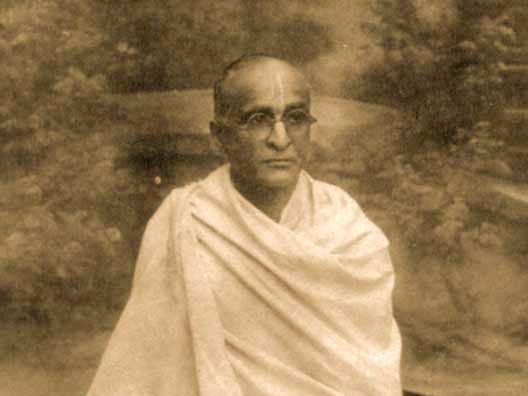MADHU BINDAVAH
THE DEPARTURE OF SRI BHAGAVATA-JANANANDA PRABHU
Seeing satisfaction and suffering as grace and good fortune.

The following is a translation of an excerpt from the 1935 edition of Saraswatī Jayaśrī (pages 331–2) which contains a citation from the summary of the thirty-first annual meeting meeting of the Śrī Dhām Prachāriṇī Sabhā in the thirty-second issue of the third volume of Gauḍīya.
The Departure of Śrī Bhāgavata-janānanda Prabhu
On Sunday, 8 March 1925, on the last day of circumambulation of the Dhām, the brāhmaṇ zamindar of the Medinipur District Śrīmat Bhavānī Charaṇ Pāhāḍī Mahāśay, who later received the name Śrī Bhāgavata-janānanda Brahmachārī, while in Śrī Chaitanya Maṭh in Śrī Dhām Māyāpur, entered the eternal Pastimes. Although he had a high birth, wealth, learning, and physical beauty, all of which are great obstructions for human beings in the Lord’s service, he engaged them all in the service of Śrī Guru and Śrī Gaurāṅga. Within a very short time, he showed such enthusiasm for service that everyone recognised his exalted nature. Just a few days before departing he composed and sent in a composition in which he predicted his own departure within a very short time and the worldwide spread of the message of Śrī Guru and Śrī Gaurāṅga. The aforementioned composition was published under the title The Duty of a Friend (Bandhura Kṛtya) on the eighth page of the twenty-seventh issue of the third volume of Gauḍīya. Just before the circumambulation of Śrī Gauḍa Maṇḍal, he joined in the propagation service of Śrī Chaitanya Maṭh. He completed the circumambulation of Śrī Gauḍa Maṇḍal and on the last day of the circumambulation of Śrī Nabadwīp he departed just like a great yogī. His separation touched the hearts of everyone, beginning with Śrī Guru-pāda-padma and including all of his godbrothers. In the thirty-first annual meeting meeting of the Śrī Dhām Prachāriṇī Sabhā (on 12 March 1925) Śrīla Prabhupād for the sake of instruction made known to everyone his remembrance and feeling of separation from his devotee. We will cite a portion of this below:
[Śrīla Bhakti Siddhānta Saraswatī Ṭhākur:]
In the statements we have heard from our revered lecturers we have seen pictures of both joy and sorrow. In this world, we continuously see such pictures.
Through the three states of satisfaction (sukha), suffering (duḥkha), and mixed satisfaction and suffering, the Lord bestows mercy upon us. The Lord is supremely merciful. Through the host of suffering in the world, He is teaching us at every step that this world is not our eternal home, and He is showing us also that during the few days we have to remain in this world we do not have to make any futile endeavour for any purpose whatsoever apart from purely satisfying the Lord.
To show us that this world which is filled with three forms of suffering is not our eternal home and clearly manifest the nature of the eternal abode filled with the joy of service, He has kept those who are His own in this world. Many people think by keeping suffering in the world He has administered injustice, but in actuality this is no so; the suffering in this world is the Lord’s greatest gift of all. Such a highly admirable and wonderful phenomenon has been lodged within suffering through which our greatest fortune (parama maṅgala) can develop. You have heard the statement of Śrī Kuntī Devī,
vipadaḥ santu tāḥ śaśvat tatra tatra jagad-guro
bhavato darśanaṁ yat syād apunar bhava-darśanam
janmaiśvarya-śruta-śrībhir edhamāna-madaḥ pumān
naivārhaty abhidhātuṁ vai tvām akiñcana-gocharam
(Śrīmad Bhāgavatam: 1.8.25–6)
[“O master of the universe, let all those dangers come again and again wherein we may have the sight of You and not again the sight of material existence. A person swelling with pride because of their birth, power, learning, or beauty can never chant Your Name; You are attainable only by those who have nothing (except You; who have no mundane ego, desire, etc.).”]
You know also the statement Śrī Sārvabhauma Bhaṭṭāchārya expressed before Śrīman Mahāprabhu,
tat te ’nukampāṁ susamīkṣamāṇo
bhuñjāna evātma-kṛtaṁ vipākam
hṛd-vāg-vapurbhir vidadhan namas te
jīveta yo mukti-pade sa dāya-bhāk
(Śrīmad Bhāgavatam: 10.14.8)
[Lord Brahmā to Śrī Kṛṣṇa: “One who sees Your mercy perfectly, endures the reactions to one’s past actions, and lives in submission to You with one’s mind, body, and words is an heir to liberation.”]
If we accept every arrangement of the Lord as the Lord’s will and grace, we reflect on the misfortune and so forth we have effected, we unite our mind and mouth according to the principle “May His will alone be fulfilled”, and we accept on our heads the satisfaction, suffering, and so forth given by Him, then we will become liberated in life (jīvan-mukta) and while in this world we will always be able to remain engaged in the Lord’s service. Apart from this type of liberation, no desire for any type of liberation based on the satisfaction of the senses should arise in our hearts. The Lord’s arrangement is always a cause of good fortune—it is for our purification. Thoughtful persons are always aware that there is no path to good fortune for the soul apart from subservience to the Lord. Suffering has been created to destroy aversion to the Lord, and satisfaction produced by the senses has been created to increase aversion to the Lord. When we can learn to accept the Lord’s arrangements of both satisfaction and suffering as the Lord’s mercy, from then on only our good fortune will arise. I offer millions and millions of obeisances at the feet of the Lord and the devotees surrendered unto Him.








